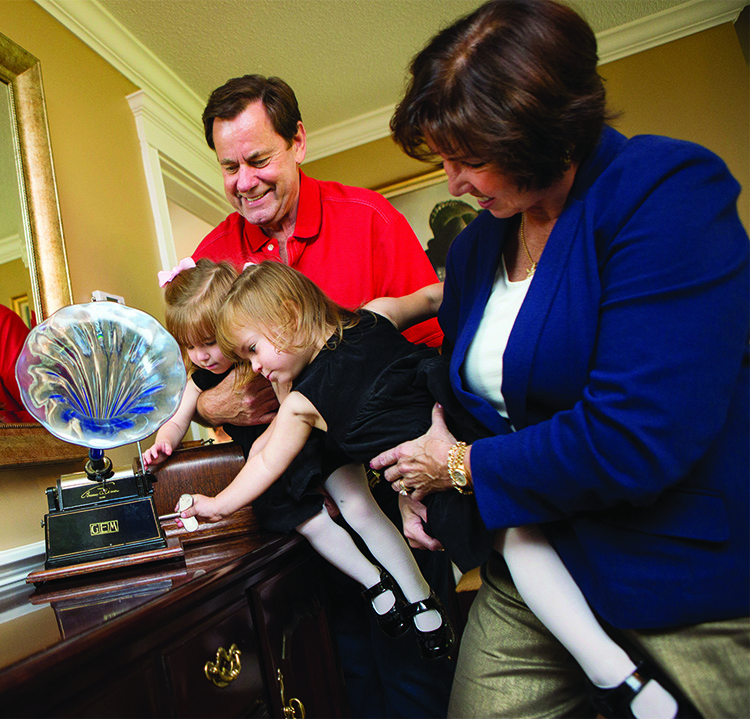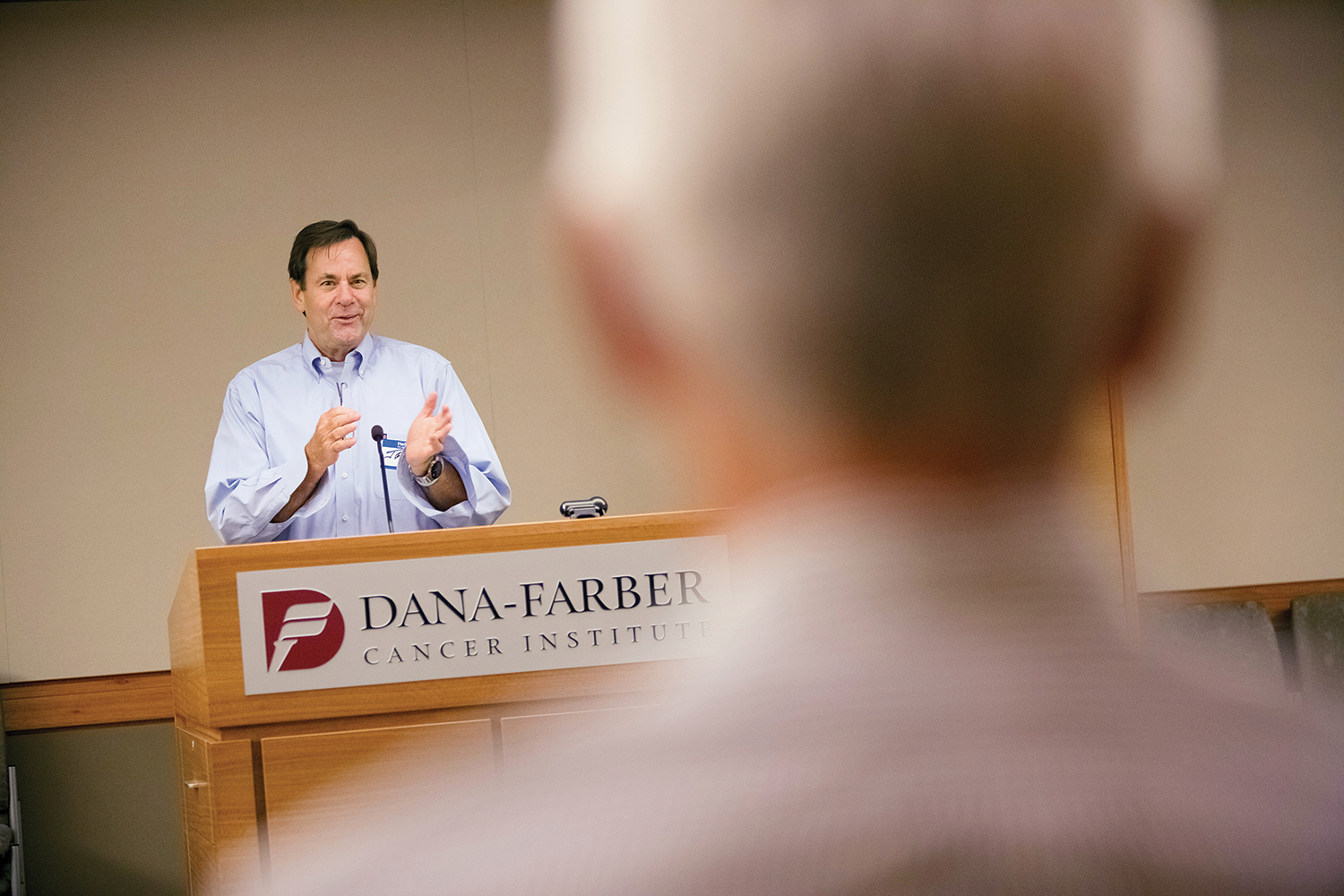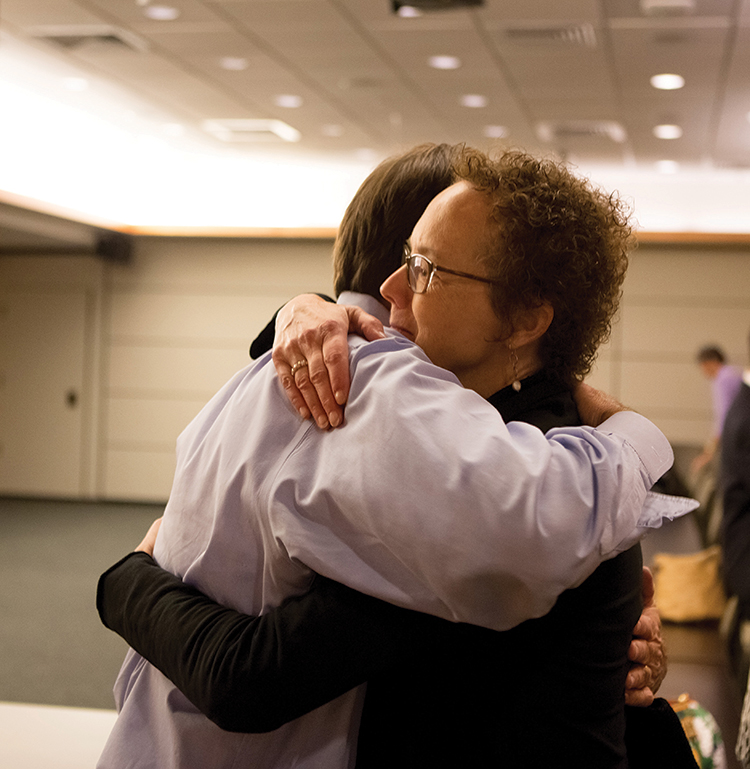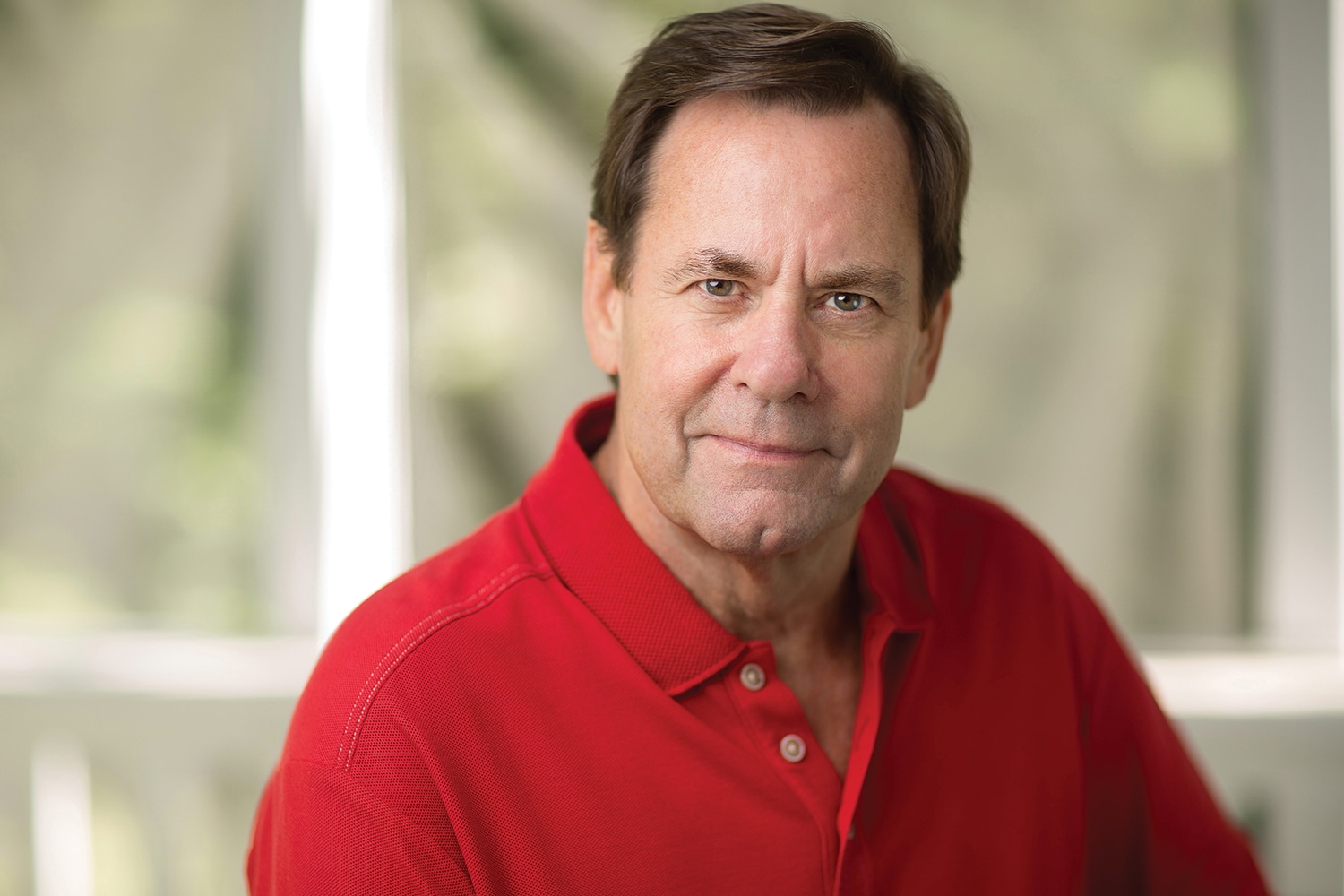Editor’s Note: On Nov. 16, 2017, Cancer Today learned that Jack Whelan died. Jack was a relentless patient advocate who was also a friend to many at the American Association for Cancer Research. The editors of Cancer Today send our condolences to Jack’s family and all who are affected by this great loss.
JACK WHELAN’S FACE LIGHTS UP when he talks about the antique phonographs displayed around his home in Andover, Mass. He enthusiastically demonstrates how turning the crank on the old machines starts the music playing, and then unexpectedly tosses a rolled-up sock into the horn of a pristine Victrola.

Jack Whelan relies on strong family support in facing his cancer. In this picture, Whelan and his wife, Jan, show their twin granddaughters, Catherine and Madeleine Gorecki, an antique phonograph from Whelan’s extensive collection. Photograph by Bryce Vickmark
“There were no volume controls on the early phonographs,” he says. “So people would say ‘put a sock in it’ when they wanted someone to … lower the volume.”
Trim, fit and with a full head of brown hair, Whelan says he is often mistaken for someone much younger than his 65 years, an impression confirmed by his attitude when he shares his encyclopedic knowledge of early record players. Behind his boyish enthusiasm and impish grin is a razor-sharp mind, a dogged inquisitiveness and a penchant for research. The same traits that fueled his search for antique phonographs—he has more than 200 in his collection—led to a successful career as a research analyst specializing in information technologies for large investment firms. Six years ago, his research skills and persistence were again put to the test when he was told he had cancer.
In 2007, Whelan, then 58, began to notice he couldn’t keep up his typical fast pace on daily power walks. He felt “bone tired” and started having nosebleeds. “I [had been] healthy, fit and active,” Whelan says. “The only medication I took was 81 milligrams of aspirin. When I started having symptoms, I thought it was a sign that I was getting older.”
Feeling that something wasn’t quite right, Whelan scheduled a check-up, where a routine test revealed a high blood protein level. His doctor referred him to Nancy Chun, a hematologist-oncologist at Winchester Hospital in a nearby Massachusetts suburb. Chun ordered a host of tests, including a chest X-ray, PET scan, CT scan, complete blood chemistry workup, and bone marrow biopsy. When the results were in, her diagnosis was Waldenström macroglobulinemia, a rare and incurable blood cancer. “I honestly wasn’t scared until I received the actual diagnosis,” Whelan says. “My wife and daughters started researching it on the web as well. We were worried that it was incurable and had a poor survival rate. But I was always confident that we’d find a way to extend my life.”
Waldenström is a type of non-Hodgkin lymphoma that starts in certain white blood cells, called B lymphocytes. The cancerous cells, which are located mainly in the bone marrow, produce abnormally large amounts of a protein called immunoglobulin M (IgM) that causes the blood to thicken, a condition called hyperviscosity. Common symptoms include nosebleeds, headaches, weakness, fever, loss of appetite and neuropathy.
Chun had never treated a patient with Waldenström—only 1,000 to 1,500 people are diagnosed with it each year in the United States—so Whelan asked for a referral to a doctor at the Dana-Farber Cancer Institute in Boston. Chun sent him to Irene Ghobrial, a hematologist-oncologist there. Ghobrial advised the Whelans that, although his type of cancer couldn’t be cured, it was slow-growing. She also told them that the survival information they found online didn’t necessarily apply to patients like Whelan, who was younger than most Waldenström patients, otherwise healthy and in a lower risk group. (Waldenström is not staged like many cancers; patients are placed in risk groups.) Ghobrial gave the Whelans something that would sustain them in those early, frightening days and in the years ahead—hope.

Jack Whelan and his family, including youngest daughter, Karen Hakenson, gather around the kitchen table. Photograph by Bryce Vickmark
Managing His Cancer
Whelan benefits from having strong family support in facing his illness: Jan, his wife of 44 years, his three daughters and his twin granddaughters. (A third granddaughter is expected this winter.) He is also fortunate to live less than an hour from Dana-Farber, which offers a program for patients with Waldenström and opportunities to take part in clinical trials.
Patients with Waldenström who have no serious or troublesome symptoms often don’t need immediate treatment. Because he was already experiencing symptoms, however, Whelan started treatment soon after his diagnosis. “Although there are no FDA-approved treatments for Waldenström, we can use many drug therapies that are used for other blood cancers,” says Ghobrial. “So we have a lot of options to help delay the progression of the disease. Patient survival is getting better and better.”
Whelan underwent a blood-filtering process called plasmapheresis, which was intended to lower the level of IgM in his blood, and had weekly infusions of a biological therapy called Rituxan (rituximab). This synthetic antibody attaches to a protein on the surface of B lymphocytes and destroys the cells. Despite the treatments, however, Whelan’s IgM levels and percent of bone marrow involvement (an indicator of cancer cells in his bone marrow) showed no significant improvement. With conventional treatment unable to make a dent, Ghobrial discussed other options with Whelan and his family, including clinical trials.
Whelan did what comes naturally to him—extensive research. He scoured the web and connected with research advocacy groups. “I knew that I was not going to follow the historical path with traditional chemotherapies that often kill healthy cells as well as cancerous cells,” he says. “I wanted to try a different, less toxic approach through clinical trials.”
So far, Whelan has participated in four phase II clinical trials. In the first trial, he took a combination of Rituxan with Velcade (bortezomib) and, in subsequent trials, he took Afinitor (everolimus) and enzastaurin. He saw modest or no improvement from these trials. In the fourth trial, however, he experienced remarkable results with panobinostat, an oral anticancer drug that blocks enzymes needed for cancer cells to grow and divide.
Uncomfortable side effects led Whelan to stop taking the medication in November 2012. “I had headaches and high blood pressure when taking panobinostat,” he says. “The headaches were tolerable for a long time, but just kept getting worse, becoming a quality of life issue. Even though I was having a good response, I needed a rest.”
Despite stopping the medication, he saw his IgM levels continue to drop. As of early 2013, the level of cancer cells in his bone marrow was down from 80 percent at diagnosis to 20 percent.
It hasn’t been an easy road for Whelan, even though his condition has improved. In addition to the headaches and blood pressure problems caused by panobinostat, he suffered a host of other side effects during his treatments—heart palpitations, shaking, neuropathy, nausea, diarrhea, pneumonia and mouth sores. On two occasions during the clinical trials, he needed emergency care to treat severe side effects. Though the medications took a toll on his body, Whelan believes he chose a sensible path to meet his goals.
“The important thing is where I’ll be in the long term,” he says. “I think I chose the smarter alternative that will improve my outcome.”
A survivor has a long-standing connection to a cancer center.
Back in 1948, millions of people listened to a national radio program broadcast from the hospital room of a 12-year-old cancer patient named “Jimmy” (not his real name) as he was visited by players from the Boston Braves baseball team. Listeners were so moved that they sent contributions to buy Jimmy a television so he could watch his favorite team’s games from his hospital bed.
That broadcast launched the start of the Jimmy Fund, a charity that raises money for cancer care and research at Boston’s Dana-Farber Cancer Institute. Over the past 65 years, the Jimmy Fund has raised more than $750 million to help Dana-Farber investigate and treat cancer and related diseases. A few years after the initial radio broadcast, Jack Whelan’s family joined the Jimmy Fund effort.
“My dad was a champion fund-raiser for the Jimmy Fund back in the early 1950s,” says Whelan, who was diagnosed in 2007 with a rare and incurable blood cancer called Waldenström macroglobulinemia. “My brother and I helped out by passing around the red-and-white tin cans to collect money at Little League baseball games or anyplace where a receptive crowd might be.”
After the Braves left Boston for Milwaukee, the Boston Red Sox selected the Jimmy Fund as its official charity in 1953. For the past three years, Whelan has represented Dana-Farber as a patient volunteer and participant in the annual Jimmy Fund telethon.
“During the telethon, I got a chance to walk on the field at Fenway Park and meet Big Papi—David Ortiz—some of the other Red Sox players and the announcers. It was an incredibly exciting thing,” he says. But he has always been aware of how important the telethon is to people with cancer and to the community at large.
“I never thought much about needing care for a rare blood cancer at the Dana-Farber,” Whelan says. “But as a good friend who lost his son to blood cancer once said, ‘Nothing in life really happens until it happens to you.’ ”
Sharing Hope, Experience and Resources
Shortly after his diagnosis, Whelan began reaching out to other cancer patients. He looked for new faces when he was getting chemotherapy infusions and tried to assure other patients they could get through their treatments. Although not much of a drinker, Whelan hung an upside-down bottle of Guinness stout on his infusion rack to bring a smile to other patients.
“It’s my way of dealing with a little bit of fear,” he says. “All cancer patients are afraid. It’s healthy to be a little bit afraid, but you have to act on it and get the best treatment you can.”
Today, Whelan devotes much of his time and energy to helping other cancer patients and their families. “I remember my mom saying the best way to minimize your own problems is to help others,” he says. “I’m strong enough now that I can go and do things for others. And I don’t have time to worry.”
At Dana-Farber, Whelan serves on the Patient Family Advisory Council, which provides patient input on new programs, patient wait time, educational materials and other issues, and also has been a spokesman for the Jimmy Fund, which raises money for cancer care and research.
Whelan also serves as the New England support group leader for the International Waldenström’s Macroglobulinemia Foundation, managing meetings where patients and caregivers share their experiences and hear presentations from leading oncologists and researchers. He speaks at support group meetings for the Massachusetts chapter of the Leukemia & Lymphoma Society (LLS) and stays active in its First Connection program, which pairs newly diagnosed patients with cancer survivors. He has spoken to 12 to 15 new Waldenström patients through the program.
“Jack provides hope and resources to patients,” says Lynne Graziano Morin, the senior patient services manager for the LLS Massachusetts chapter. “When new patients are able to talk with someone like Jack who has already gone through many treatments and is doing so well, it really makes a difference in their outlook.”
Whelan also participates in research advocacy programs, such as the Scientist↔Survivor Program of the American Association for Cancer Research and the patient advocate programs sponsored by the American Society of Clinical Oncology.
“These programs put scientists together with survivors who are interested in learning as much as they can,” Whelan says. “I can now take complex subjects and translate them into simpler terms for other patients, whether I’m speaking to a group, talking with patients one-on-one or writing a blog.”
Whelan used what he learned through these programs when he joined the effort to draw attention to oral parity legislation—lawsthat require insurance companies to cover oral medications at the same level that they pay for traditional chemotherapy drugs given intravenously or by injection. On behalf of cancer patients throughout Massachusetts, Whelan called, emailed and met face-to-face with lawmakers for more than a year to encourage passage of legislation. In January 2013, Gov. Deval Patrick signed an oral parity bill into law, making Massachusetts the 21st state to do so. Since then, Whelan has worked for passage in other states.

Jack Whelan is the New England support group leader for the International Waldenström’s Macroglobulinemia Foundation, which meets every other month at Dana-Farber Cancer Institute in Boston. Photograph by Bryce Vickmark
A Passion for Clinical Trials
Whelan has become a passionate advocate for cancer clinical trials when speaking to patients with Waldenström macroglobulinemia and other types of cancer. He has even developed, with a team of oncologists and web developers, a nonprofit website to help people with blood cancers find clinical trials that might be suitable for them.

During the September meeting of the International Waldenström’s Macroglobulinemia Foundation, Jack Whelan hugs cancer survivor Eileen Sullivan. Photograph by Bryce Vickmark
“Some people think that clinical trials are a last resort,” Whelan says. “But I am a big proponent of clinical trials for Waldenström that involve targeted molecular-level therapies. The move toward personalized medicine—which is really finding the right drug for your particular disease—is incredible.”
Whelan says it’s vital that cancer patients take an active role in their treatment. “I tell patients not to take a car-wash approach” in which they passively accept whatever their doctors advise. “Get a second opinion, be proactive about your care and explore all your options, including clinical trials.”
Today, Whelan takes only the 81 milligrams of aspirin he took daily before his diagnosis. His level of IgM, the protein that causes the blood to thicken, has dropped and his blood cell and platelet counts are in the normal range, indicating that treatment has likely helped control his cancer. But he expects he’ll need to go back on a treatment regimen in the future.
“Cancer is a nasty, nasty thing to have,” he says. “You can never turn your back on it. I just have this confidence that science is going to help me get through this.”
Cancer Today magazine is free to cancer patients, survivors and caregivers who live in the U.S. Subscribe here to receive four issues per year.





